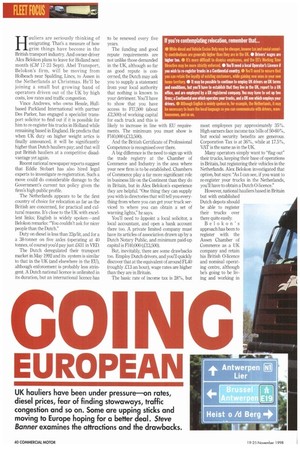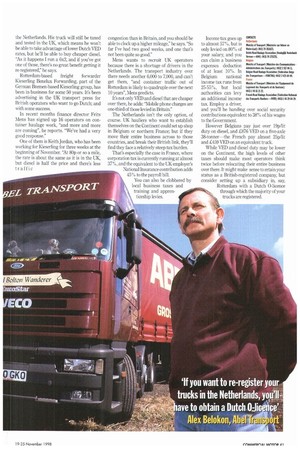FLEET FOCOS
Page 42

Page 43

If you've noticed an error in this article please click here to report it so we can fix it.
UK hauliers have been under pressure—on rates, diesel prices, fear of finding stowaways, traffic congestion and so on. Some are upping sticks and moving to Europe hoping for a better deal. Steve Banner examines the attractions and the drawbacks.
Hauliers are seriously thinking of emigrating. That's a measure of how grim things have become in the British transport industry. And owner-driver Alex Belokon plans to leave for Holland next month (CM 17-23 Sept). Abel Transport, Belokon's firm, will be moving from Holbeach near Spalding, Lincs, to Assen in the Netherlands at Christmas. He'll be joining a small but growing band of operators driven out of the UK by high costs, low rates and traffic congestion.
Vince Andrews, who owns Hessle, Hullbased Parkland International with partner Des Parker, has engaged a specialist transport solicitor to find out if it is possible for him to re-register his trucks in Holland while remaining based in England. He predicts that when UK duty on higher weight artics is finally announced, it will be significantly higher than Dutch hauliers pay; and that will put British hauliers at a competitive disadvantage yet again.
Recent national newspaper reports suggest that Eddie Stobart has also hired legal experts to investigate re-registration. Such a move could do considerable damage to the Government's current tax policy given the firm's high public profile.
The Netherlands appears to be the first country of choice for relocation as far as the British are concerned, for practical and cultural reasons. It's close to the UK with excellent links; English is widely spoken—and Belokon remarks: "You couldn't ask for nicer people than the Dutch."
Duty on diesel is less than 23p/lit, and for a a 38-tonner on five axles (operating at 40 tonnes, of course) you'd pay just £631 in VED.
The Dutch deregulated their transport market in May 1992 and its system is similar to that in the UK (and elsewhere in the EU), although enforcement is probably less stringent. A Dutch national licence is unlimited in its duration, but an international licence has to be renewed every five years.
The funding and good repute requirements are not unlike those demanded in the UK, although so far as good repute is concerned, the Dutch may ask you to supply a statement from your local authority that nothing is known to your detriment. You'll have to show that you have access to F17,500 (about £2,500) of working capital for each truck and this is likely to increase in line with HU requirements. The minimum you must show is F140,000 (L13,500).
And the British Certificate of Professional Competence is recognised over there.
A big difference is the need to sign up with the trade registry at the Chamber of Commerce and Industry in the area where your new firm is to be established. Chambers of Commerce play a far more significant role in business life on the Continent than they do in Britain, but in Alex Belokon's experience they are helpful. "One thing they can supply you with is directories that will tell you everything from where you can get your truck serviced to where you can obtain a set of warning lights," he says.
You'll need to appoint a local solicitor, a local accountant, and open a bank account there too. A private limited company must have its articles of association drawn up by a Dutch Notary Public, and minimum paid-up capital is FI40,000 (£13,500).
But, inevitably, there are some drawbacks too. Employ Dutch drivers, and you'll quickly discover that at the equivalent of around FL40 (roughly £13 an hour), wage rates are higher than they are in Britain.
The basic rate of income tax is 28%, but
most employees pay approximately 35%. High earners face income tax bills of 50-60%, but social security benefits are generous. Corporation Tax is at 36%, while at 17.5%, VAT is the same as in the UK.
Many operators simply want to "flag out" their trucks, keeping their base of operations in Britain, but registering their vehicles in the Netherlands. Alex Belokon investigated that option, but says: "As I can see, if you want to re-register your trucks in the Netherlands, you'll have to obtain a Dutch 0-licence."
However, national hauliers based in Britain but with established Dutch depots should be able to register their trucks over there quite easily.
Belokon's approach has been to register with the Assen Chamber of Commerce as a UK company and retain his British 0-licence and nominal operating centre, although he going to be living and working in the Netherlands. His truck will still be taxed and tested in the UK, which means he won't be able to take advantage of lower Dutch VED rates, but he'll be able to buy cheaper diesel. "As it happens I run a 6x2, and if you've got one of those, there's no great benefit getting it re-registered," he says.
Rotterdam-based freight forwarder Kieserling Benelux Forwarding, part of the German Bremen-based Kieserling group, has been in business for some 50 years. It's been advertising in the UK transport press for British operators who want to go Dutch; and with some success.
In recent months finance director Frits Mens has signed up 16 operators on container haulage work, "and more and more are coming", he reports. "We've had a very good response."
One of them is Keith Jordan, who has been working for Kieserling for three weeks at the beginning of November. "At 80p or so a mile, the rate is about the same as it is in the UK, but diesel is half the price and there's less traffic congestion than in Britain, and you should be able to clock up a higher mileage," he says. "So far I've had two good weeks, and one that's not been quite so good."
Mens wants to recruit UK operators because there is a shortage of drivers in the Netherlands. The transport industry over there needs another 6,000 to 7,000, and can't get them, "and container traffic out of Rotterdam is likely to quadruple over the next 10 years", Mens predicts.
It's not only VED and diesel that are cheaper over there, he adds: "Mobile phone charges are one-third of those levied in Britain."
The Netherlands isn't the only option, of course. UK hauliers who want to establish themselves on the Continent could set up shop in Belgium or northern France; but if they move their entire business across to those countries, and break their British link, they'll find they face a relatively steep tax burden.
That's especially the case in France, where corporation tax is currently running at almost 37%, and the equivalent to the UK employer's National Insurance contribution adds 45% to the payroll bill.
You can also be clobbered by local business taxes and training and apprenticeship levies. Income tax goes up to almost 57%, but is only levied on 80% of your salary, and you can claim a business expenses deduction of at least 10%. In Belgium national income tax runs from 25-55%, but local authorities can levy an additional income tax. Employ a driver, and you'll be handing over social security contributions equivalent to 38°/o of his wages to the Government.
However Belgians pay just over 19p/lit duty on diesel, and £876 VED on a five-axle 38-tonner—the French pay almost 25p/lit and £459 VED on an equivalent truck.
While VED and diesel duty may be lower on the Continent, the high levels of other taxes should make most operators think twice before relocating their entire business over there. It might make sense to retain your status as a British-registered company, but consider setting up a subsidiary in, say, Rotterdam with a Dutch 0-licence through which the majority of your trucks are registered.
ranistm of Transport .:51iristere de I Traipernent du Lotienent des Transports et du loin sme 0033 1 40 8121 22.
Depth Road Radom Association (Federation Nation* des Transports Anthers -FITS): 0033 I 44 29 04 29
If you're contemplatiig relocation, remember that..
• While diesel and Vehicle Excise Duty may be cheaper, income tax and social security contributions are generally higher than they are in the UK. • Drivers' wages are
higher too. • It's more difficult Time
may be -4,-;=Hv • You'll need a local Operator's Licence if you wish to re-register trucks in a Continental country. isure that • It may be possible to continue to employ UK drivers on UK terms and conditions, but you'll have to establish that they live in the UK, report to a UK office, and are employed by a UK registered company. You may have to set up two firms; a Continental one which operates your trucks, and a UK one which employs your drivers.
















































































































